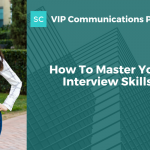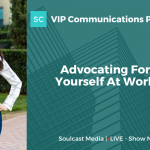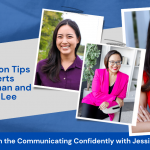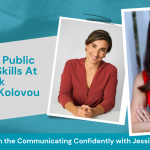How To Communicate Better In A Job Interview
Think about your past job interviews. Do you feel like you effectively communicated your thoughts and ideas? According to Legal Jobs, you only have seven seconds to make a good first impression.
Job interviews can make you feel uneasy. It’s typical to feel a little nervous when walking into a job interview. Your nerves may prevent you from showcasing yourself. However, it is important for you to feel confident and communicate effectively in an interview setting.
Below are three things you can focus on to communicate better in your next job interview.
1. Body Language
Your body language can speak volumes. As you enter an interview setting, consider how your body language can positively impact your communication.
Consider the following:
- Eye Contact – Positive eye contact is one way to communicate better during a job interview. When you maintain good eye contact, it shows you are confident in yourself and your message. For example, when you meet your interviewer, maintain eye contact when you shake their hand. Or, if you are in a virtual setting, look directly at the camera. Looking at the camera will make the other person feel like you are looking directly at them. If you don’t make eye contact, or have shifty eyes, the interviewer may feel like you aren’t sure of yourself.
- Hand Gestures – Even when you are in a virtual interview, your hand gestures can help you communicate better. Using hand gestures can indicate engagement and excitement. For example, if you are in a virtual interview, take your hand off of the mouse and use your hands while you speak. In person, you can use your hands to emphasize points by holding up fingers for each topic. If you aren’t sure about using hand gestures, practice answering interview questions in a mirror. The more natural your hand gestures are, the more relaxed and confident you will be during the interview.

- Head + Shoulders – You want your head and shoulders to be relaxed. This is because if you tense up your shoulders, you will come across as anxious and unsure. Tensing up may also cause your voice to strain. This prevents you from communicating confidently. Keep your head held high and relax your shoulders. Before the interview, you can stretch your neck from side to side to prevent your shoulders from creeping up next to your ears.
Being aware of your body language will help you communicate better in your next interview.
2. Speak With Confidence
If you want to communicate better in a job interview, you must speak with confidence. This is because when you are confident in your communications you can convey your message in a way everyone understands.
Consider the following:
- Be Prepared – Being prepared for your interview will help boost your confidence. There are several ways you can prepare. Research the company before your interview. It is always a good idea to know a little bit about what the company has done and anything about the company’s future. For example, if the company has just announced a new international partnership, brush up on who it is with and how it will impact it. You don’t have to know everything, but a little knowledge will go a long way. It would be best if you also prepared yourself for any questions the interviewer may have for you, as well. For example, if you have a break in your job history, be prepared to explain the why behind your break. The more prepared you are, the more confident you will be.

- Avoid Filler Words – Filler words are words such as um, ah, and uh. These words distract the listener from your message. Filler words also make you appear less confident. If you want to communicate better in a job interview, you need to avoid filler words. Record yourself answering interview questions. Listen for filler words. Practice responding without using these words. It can be tricky, especially when you are in an interview and aren’t 100% sure what the questions may be. However, one way to avoid using these words is to pause before speaking. You can practice pausing before responding. This will make your communications much more confident to the listener.
- Breathe – Nerves can cause your breath to be more shallow, and this will make your tone of voice much more strained. A strained voice doesn’t come across as confident. Be sure you take deep enough breaths so your voice can carry your message. For example, before you go into your interview, take a deep breath, hold your breath for a moment and then release. Do this a few times. This will also help you relax before your interview.
Speaking with confidence boosts your communications and conveys a clear message.
3. Actively Listen
Listening is an important part of communicating better in a job interview. You can only confidently respond if you understand what the other person has said.
There are several ways you can practice active listening in a job interview.
- Listen, Don’t Respond – Often, when you listen to someone, you may start to formulate what you plan to say next instead of listening to the other person. This is especially true if you are nervous, which can happen during a job interview. If you want to communicate better, you have to pause and listen. For example, instead of trying to come up with an answer while the other person is speaking, avoid this distraction and focus on what the other person is saying. After they have finished speaking, you can take a moment and then respond. Otherwise, you may miss an important part of their message. This could make the person feel like you aren’t paying attention which doesn’t bode well in a job interview setting.
- Paraphrase – Paraphrasing what the other person said is a great way to practice active listening. This also will help you when you respond to their question. For example, if the interviewer asks you a question about your previous employment, you can respond with something like, “I’m really glad you asked about my previous employer. You mentioned xyz about the company; I’d love to tell you about how I was a part of that project.” Using what the interviewer said in your response shows you were paying attention to their message.
Actively listening will help you when formulating your responses to each interview question.
Job interviews are a part of every career path. Learning how to communicate better while in a job interview will help you stand out and get hired.
__
Whenever you’re ready, there are 3 ways we can help you:
- Discover your communications style so you know where to start. Over 4,000 people have found theirs here.
- Attend our monthly communication workshop to build communications confidence (new topics: public speaking, advocating for yourself, building credibility, etc) here.
- Get your brand in front of 43k+ people by sponsoring our newsletter or Soulcast Media | LIVE LinkedIn events [contact: hello@soulcastmedia.com]











